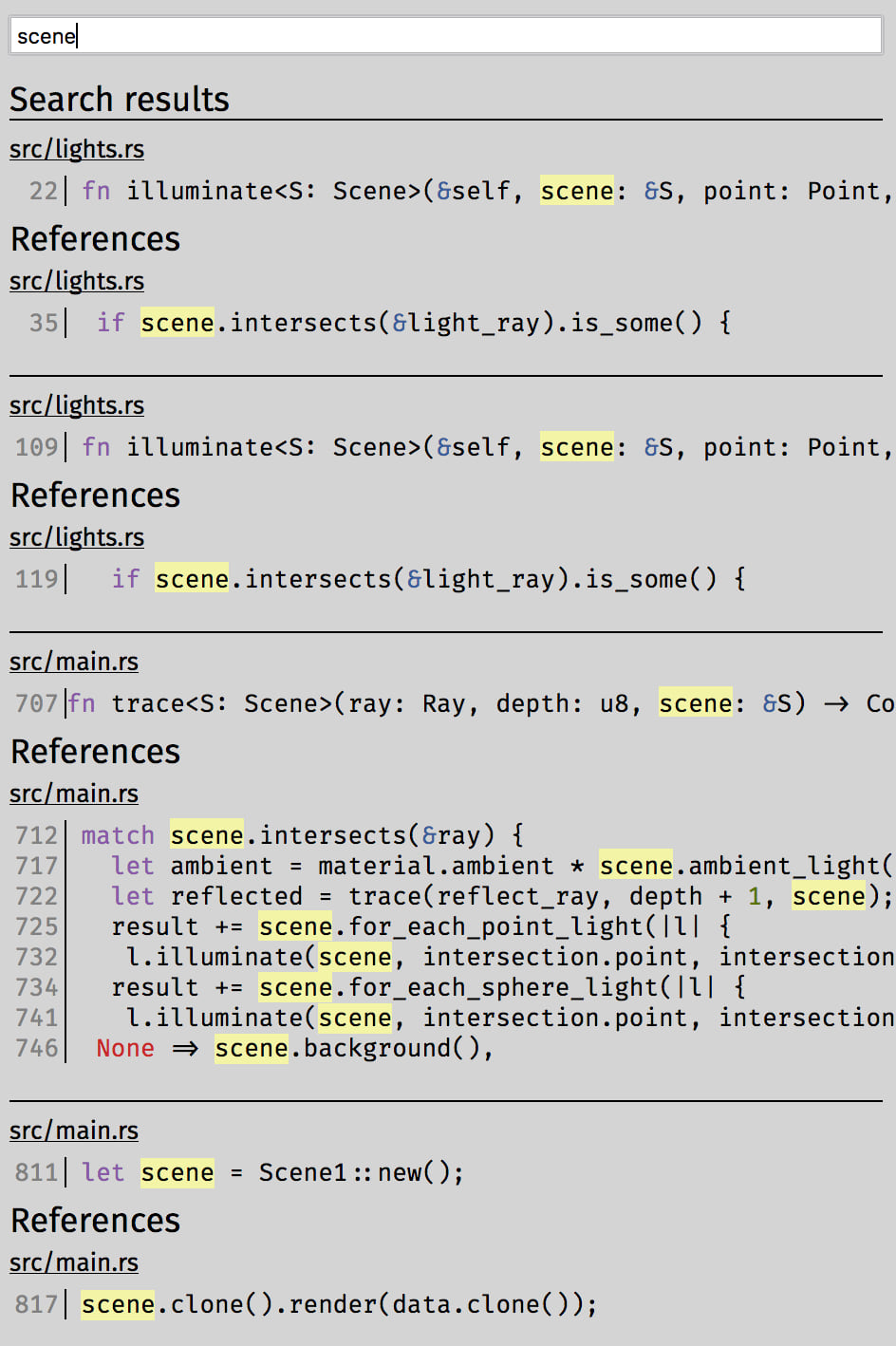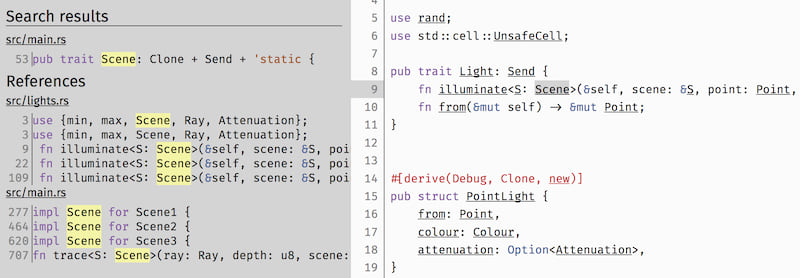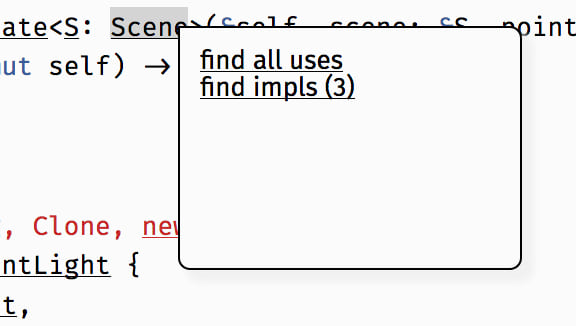9 releases
Uses old Rust 2015
| 0.1.8 | Nov 16, 2019 |
|---|---|
| 0.1.7 | Aug 18, 2019 |
| 0.1.6 | Dec 24, 2018 |
| 0.1.5 | Sep 18, 2018 |
| 0.1.2 | Apr 29, 2018 |
#978 in Development tools
35 downloads per month
2.5MB
3K
SLoC
Contains (WOFF font, 100KB) static/fonts/FiraCode-Bold.woff, (WOFF font, 99KB) static/fonts/FiraCode-Light.woff, (WOFF font, 99KB) static/fonts/FiraCode-Medium.woff, (WOFF font, 99KB) static/fonts/FiraCode-Regular.woff, (WOFF font, 96KB) static/fonts/FiraSans-Light.woff, (WOFF font, 90KB) static/fonts/FiraSans-Medium.woff and 1 more.
cargo src
A Rust source browser. Explore your Rust project with semantic understanding of the code. Features:
- syntax highlighting
- jump to def (click on a reference)
- find all references (click on a definition)
- smart identifier search
- types (and field info) on hover
- smart usage highlighting
- find all impls (right click on a type or trait name)
- jump to docs for standard library references
- directory browsing
- symbol browsing
Uses knowledge from the RLS.
This is work-in-progress, pre-release software, expect bugs and plenty of rough edges.
Contents:
Screenshots

Hover to show the type of an identifier:

Search for an identifier name (shows definitions, and all references to each definition):

Find all uses of a definition:

Right click an identifier to show more options

Installing and running
Requires a nightly version of Rust.
To install, run cargo install cargo-src.
Then, to run: cargo src in a directory where you would usually run cargo build.
You can run cargo src --open to open the output of cargo src directly in your
web browser.
cargo src will start a web server and build (cargo check) and index your code.
This may take some time (depending on your crate, up to twice as long as a normal
build). You can browse the source in whilst indexing, but you'll be missing all
the good stuff like jump-to-def and search.
Customisation
Create a rustw.toml file in your project's directory. See src/config.rs
or run cargo src -- -h for the options available and their defaults.
Some features need configuration in the rustw.toml before they can be used.
edit_command = "subl $file:$line"
To be able to open files in your local editor. This example works for sublime
text (subl). Use the $file and $line variables as appropriate for your
editor.
vcs_link = "https://github.com/nrc/rustw-test/blob/master/$file#L$line"
For links to the code in version control, GitHub, in the example.
Building
Requires a nightly version of Rust.
Get the source code from https://github.com/nrc/cargo-src.
- Install the dependencies:
npm installoryarn - Build the JS components:
npm run buildoryarn build - Build the Rust parts:
cargo build --release
Running
Run CARGO=cargo /<your local filepath>/rustw/target/release/cargo-src in your
project's directory (i.e., the directory you would normally use cargo build
from).
Running cargo src will start a web server and display a URL in the console. To
terminate the server, use ctrl + c. If you point your browser at the provided
URL, it will list the directories and files from your project, which you can then
use to view the code. The terminal is only used to display logging, it can
be ignored.
You can use --open to open the cargo src browser directly in your web browser.
Currently, cargo src has only been tested on Firefox on Linux and MacOS (issue 48).
Troubleshooting
If you get an error like error while loading shared libraries while starting
up cargo src you should try the following:
On Linux:
export LD_LIBRARY_PATH=$(rustc --print sysroot)/lib:$LD_LIBRARY_PATH
On MacOS:
export DYLD_LIBRARY_PATH=$(rustc --print sysroot)/lib:$DYLD_LIBRARY_PATH
Contributing
Cargo src is open source (dual-licensed under the Apache 2.0 and MIT licenses) and contributions are welcome! You can help by testing and reporting issues. Code, tests, and documentation are very welcome, you can browse all issues or easy issues to find something to work on.
If you'd like help or want to talk about cargo, you can find me on the rust-dev-tools irc channel (nrc), email (my irc handle @mozilla.com), or twitter (@nick_r_cameron).
The cargo src server is written in Rust and uses Hyper. It runs cargo check as
a separate process and only really deals with output on stdout/stderr.
The cargo src frontend is a single page web app written in HTML and Javascript. It uses React and JQuery.
Dependencies
~24MB
~411K SLoC